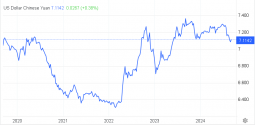How much of this lack of consumption hysteria is actually due to Chinese consumers belt-tightening and how much of it is domestic Chinese companies beginning to take market share away in industries traditionally dominated by western firms (like automobiles)?
Both would ultimately result in western firms becoming more bearish in China.
Something tells me it's a mix of both.
Both would ultimately result in western firms becoming more bearish in China.
Something tells me it's a mix of both.

